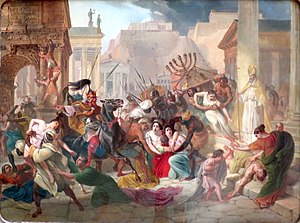
Back Разграбване на Рим (455) Bulgarian Saqueig de Roma (455) Catalan Vyplenění Říma (455) Czech Plünderung Roms (455) German Saqueo de Roma (455) Spanish Rooman ryöstö (455) Finnish Sac de Rome (455) French ביזת רומא (455) HE Penjarahan Roma (455) ID Sacco di Roma (455) Italian
This article's lead section may be too short to adequately summarize the key points. (February 2021) |
| Sack of Rome | |||||||
|---|---|---|---|---|---|---|---|
| Part of the fall of the Western Roman Empire | |||||||
 Genseric sacking Rome, by Karl Briullov | |||||||
| |||||||
| Belligerents | |||||||
| Vandal Kingdom |
| ||||||
| Commanders and leaders | |||||||
| Gaiseric | Petronius Maximus † | ||||||
| Casualties and losses | |||||||
| Unknown | more than 400,000 civilians and defensors | ||||||
The Sack of Rome in 455 AD was carried out by the Vandals led by their king Genseric.
A peace treaty between the Western Roman Empire and Vandal Kingdom included a marriage of state between the daughter of Roman Emperor Valentinian III and the son of Genseric. Valentinian's successor Petronius Maximus violated the treaty by marrying his son to Valentinian's daughter which led to Genseric declaring Rome violated their treaty and launched an invasion. Maximus did not organise a defence of Rome and was lynched by a Roman mob while trying to escape the city. Pope Leo I convinced Genseric to avoid the use of violence against residents of the city. The Vandals looted Rome for two weeks, causing widespread destruction to the city, stripping it of most of its valuables, and taking some residents as slaves. Maximus's successor Avitus had little support which led to the outbreak of the Roman civil war of 456.
The Sack of Rome in 455 and the Visigothic sack of 410 shocked the Roman world and symbolized the decline and impending fall of the Western Roman Empire, marking a pivotal moment in European history.
- ^ Gwatkin, Henry Melvill; Whitney, James Pounder; et al. (1911). The Cambridge Medieval History. Macmillan. pp. 308.
On 2 June Gaiseric marched into Rome ... The Vandals stayed a fortnight...
© MMXXIII Rich X Search. We shall prevail. All rights reserved. Rich X Search